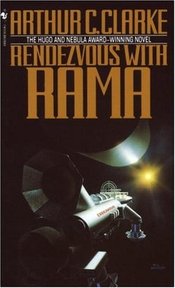 It’s amazing how efficient the classics can be.
It’s amazing how efficient the classics can be.
Over 35 years old, Arthur C. Clarke’s Rendezvous with Rama checks in at a slim 240 pages. The technology, both human and alien, is nothing to blow you away. No singularity, cyberspace, virtual reality, or quantum computing to be found here. I’m guessing that even by the standards of the mid-70’s, the sci-fi aspect of Rama was pretty tame.
At it’s heart, Rendezvous with Rama is a mystery novel. Where did this massive alien cylinder come from? Why is it in our solar system? What is it for and how does it work? Where is it going and what is it going to do? Through a series of increasingly tense challenges, Clark weaves a totally engrossing tale that reveals a lot about human nature, without really revealing anything about the intruding alien craft.
A distinctive feature of the book, relatively to the more “modern” stuff I’ve been reading, is it’s faith in good old science. Clark acknowledges the petty wars within and between disciplines, but the astronauts that explore Rama are fundamentally scientists, and engineers, carefully investigating a new occurrence in the world. And he manages to make them quite heroic. Some are even steadfastly religious, yet still maintain scientific discipline. Would that this attribute was more common in these anti-intellectual times.
Apparently there’s a movie adaptation of Rendezvous with Rama in development. Obviously Hollywood can screw up anything (Bonfire of the Vanities anyone?), but it looks like there’s a solid foundation with Morgan Freeman starring and David Fincher directing.
Speaking of Freeman, did you know he was a regular on The Electric Company? I only know this because one of my best buddies from college TF clued me in. Coincidentally I vividly remember TF reading Rendezvous with Rama our freshman year.